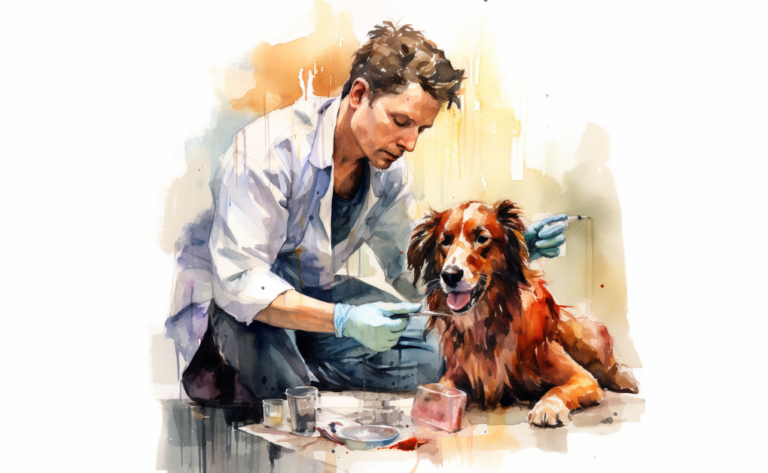What is Vomiting in Dogs?
What is it?
How is it Treated?
Breed Predispositions
Bulldogs Boxers Miniature Schnauzers Cavalier King Charles Spaniels German Shepherds Yorkshire Terriers Doberman Pinschers Dachshunds Golden Retrievers Labrador Retrievers
Introduction
One sunny afternoon, as Jessica enjoyed a relaxing day at home, she heard a strange noise coming from the backyard. Rushing to investigate, she found her beloved Boxer, Rocky, hunched over, appearing distressed and disoriented. To her dismay, she realized that he had just vomited. Concerned for Rocky’s health and unsure of the cause, Jessica decided it was time for a visit to the veterinarian.
Vomiting in dogs involves forcefully expulsing their stomach contents, sometimes even their upper small intestine, out through their mouth. This is not to be confused with when a dog regurgitates, which is a less forceful, more passive expulsion of food or fluid. Dog vomit is a common issue that many pet parents face, and it can be distressing to see our cherished canine companions in such discomfort. However, it’s important to understand that vomiting or regurgitating in dogs is a symptom that can be linked to a variety of conditions, ranging from mild to severe.
Comprehending this symptom requires a basic understanding of the dog’s digestive system, which begins at the mouth and ends at the anus. This system is critical in breaking down food, absorbing nutrients, and eliminating waste. Therefore, while vomiting is the forceful ejection of stomach contents, it’s also a potential cause for concern that could necessitate veterinary attention.
What is the Difference Between Vomiting and Regurgitation
Vomiting and regurgitation in dogs are two distinct processes, although they can sometimes be confused due to the expulsion of food or fluid from the dog’s mouth in both cases.
Vomiting
Vomiting is an active process. It’s typically preceded by signs of nausea, such as drooling, lip licking, and swallowing excessively. When a dog vomits, the abdominal muscles contract forcefully, expulsing the stomach’s contents, and sometimes material from the upper small intestine, through the mouth. As a result, the vomit may contain partially digested food, yellowish bile, or foam. Vomiting can be caused by various issues, including gastrointestinal diseases, ingestion of toxic substances, systemic diseases, or even stress and anxiety.
Regurgitation
Regurgitation, on the other hand, is a passive process. There is usually no warning, and the dog may seem as surprised as you are. The food or fluid is expelled almost effortlessly from the mouth without the abdominal contractions seen in vomiting. The material brought up by regurgitation is usually undigested, may have a tubular shape, and is often covered with slimy mucus. Regurgitation can be due to problems with the esophagus, such as an obstruction or a condition called megaesophagus, where the esophagus is dilated and loses its ability to push food into the stomach.
Both vomiting and regurgitation can be serious depending on the frequency, volume, and the dog’s overall condition. They should warrant a trip to the vet if they persist or are accompanied by other signs of illness.
Causes of Dog Vomiting
There’s a broad list of possible causes that can trigger vomiting in dogs, with scenarios ranging from relatively harmless instances, like dietary indiscretion (when a dog eats something it shouldn’t), to more severe health conditions. Below are some of the major causes:
- Dietary Indiscretion: Dogs are notoriously curious and often ingest inappropriate items such as spoiled food, plants, toys, or other foreign objects, leading to gastrointestinal upset.
- Gastrointestinal Obstruction: A foreign body, tumor, or any other blockage in the gastrointestinal tract can cause vomiting.

- Infectious Diseases: Bacterial, viral, or parasitic infections like parvovirus, leptospirosis, or intestinal parasites like roundworms can lead to episodes of vomiting in dogs.
- Toxins: Consumption of toxic substances, including specific plants, chemicals, antifreeze, chocolate, or human medications, can cause a dog to vomit.
- Systemic Diseases: Certain conditions like kidney or liver disease, pancreatitis, diabetes, hyperthyroidism, or inflammatory bowel disease can trigger vomiting.
- Gastroenteritis: This term refers to an inflammation of the stomach and intestines. It’s often caused by a bacterial or viral infection, eating spoiled dog food, or consuming a toxic substance.
- Drugs and Medications: Some medications, including chemotherapy drugs, antibiotics, and specific pain medications, can cause a dog to vomit.
- Dietary Sensitivities or Allergies: In some cases, dogs may vomit in response to certain foods or ingredients, indicating a potential food allergy.
- Bloat (Gastric Dilatation-Volvulus): This serious condition typically affects large breed dogs. It causes the dog’s stomach to twist, resulting in severe vomiting or retching without bringing anything up.
Vomiting in dogs can present differently – it can be white foam or yellow vomit if the dog’s stomach is empty except for bile (sometimes referred to as bilious vomiting syndrome) or brown vomit if there’s undigested food. For example, green vomit could suggest that the dog could have eaten grass or that there’s an intestinal blockage.
If your dog frequently vomits, it’s essential to seek veterinary attention promptly. First, the vet must determine the underlying cause, whether it’s as benign as motion sickness or as serious as an intestinal blockage, to provide appropriate treatment.
Diagnosis of Vomiting in Dogs
Determining the cause of a vomiting dog involves a comprehensive procedure that factors in the dog’s overall well-being, medical history, and specific symptoms. Here’s an inside look into how veterinary care might approach diagnosing a dog with chronic vomiting:
In-Depth History
An in-depth understanding of the dog’s history is crucial to diagnosing any health issue, including vomiting. By collecting extensive details about your dog’s medical history, behaviors, and recent lifestyle changes, the vet can understand the potential causes and adjust the diagnostic process accordingly. The vet may probe into several aspects during this stage of getting an in-depth history:
Physical Evaluation
An essential initial step when diagnosing the cause of a dog’s vomiting may be a physical evaluation by a veterinarian. During this assessment, the vet will examine your dog’s overall health and look for any signs of illness that might indicate the reason for the vomiting. Here’s what typically is included in the physical evaluation:
Laboratory Tests
Laboratory tests play a pivotal role in diagnosing a vomiting dog. These tests offer a detailed view of the dog’s internal health, highlighting abnormalities that might not be evident during a physical examination. Below is a glimpse at the most frequently used laboratory tests for these situations:
- Complete Blood Count (CBC): A CBC can shed light on the dog’s red and white blood cells and platelets. It can help detect conditions like anemia, inflammation, infection, and certain types of cancer.
- Blood Chemistry Panel: This test evaluates various substances in the blood, such as enzymes, proteins, electrolytes, and waste products. Alterations in these levels can suggest problems with organs like the liver, kidneys, or pancreas, all of which can result in vomiting.
- Urinalysis: Analyzing a dog’s urine can reveal much about its health. It can show signs of urinary tract infections, kidney disease, diabetes, and other conditions, some of which may lead to vomiting if they cause a buildup of toxins in the dog’s body.
- Fecal Examination: This test looks for parasites, bacteria, and other pathogens in the dog’s stool. Some of these can cause upset to the stomach and upper part of the digestive tract, leading to vomiting.
- Pancreatic Tests: Specific tests can measure levels of pancreatic enzymes in the blood. These can help diagnose pancreatitis, which often causes dogs’ stomach acid to act up, leading to vomiting.
- Thyroid Test: Though rare in dogs, hyperthyroidism can cause vomiting. A straightforward blood test can rule out this condition.
Bear in mind these are potential tests a vet might conduct to determine why a dog is vomiting. The specific tests will depend on the dog’s symptoms, health history, and the outcome of its physical examination. Further specialized tests may be required if these preliminary tests don’t identify the cause of the vomiting. So, if you’re wondering how to tell if your dog requires any of these tests, your vet will guide you through the process and may even need to induce vomiting for specific examinations.
Imaging
Imaging is a crucial part of the diagnostic process when a dog is experiencing vomiting. It allows veterinarians to visualize the animal’s internal structures and identify any abnormalities that might be causing the issue. Here’s an overview of the most common imaging techniques used in these cases:
- Radiographs (X-rays): X-rays provide a two-dimensional image of the dog’s body, allowing the vet to see bones and the silhouette of some internal organs. This can help identify a range of issues, such as foreign objects in the stomach or intestines, tumors, blockages, or certain types of injuries.
- Ultrasound: An ultrasound uses sound waves to create a detailed image of the dog’s internal organs. This can be particularly useful for identifying soft tissue abnormalities that might not appear on an X-ray, such as inflammation, masses, or changes in organ size. An ultrasound can also help the vet see if the stomach or intestines are thickened, a sign of chronic vomiting.
- Endoscopy: While not a typical imaging method, endoscopy involves inserting a thin, flexible tube with a small camera attached to the dog’s gastrointestinal tract. This allows the vet to visualize the lining of the stomach and intestines directly and can be particularly useful for identifying inflammation, ulcers, tumors, or foreign bodies.
- Computed Tomography (CT) or Magnetic Resonance Imaging (MRI): These advanced imaging techniques provide a more detailed, three-dimensional view of the dog’s body. While not commonly used for cases of vomiting due to their high cost and the need for the dog to be under anesthesia, they can be very helpful in certain cases, such as when a tumor is suspected.
Remember, the specific imaging techniques will depend on the dog’s symptoms, overall health, and the results of its physical examination and initial tests. The goal is to get a clear picture of what’s happening inside the dog’s body to determine the most effective treatment.
Endoscopy or Biopsy
Endoscopy and biopsy are more advanced procedures that veterinarians might use to diagnose the cause of vomiting in dogs when other, less invasive methods don’t provide sufficient answers.
Endoscopy: During an endoscopy, a flexible tube with a camera and light attached is inserted through the dog’s mouth and down into the stomach and intestines. This allows the vet to visualize the inner lining of the gastrointestinal tract directly and look for any abnormalities, such as ulcers, tumors, inflammation, or foreign bodies, that could be causing the vomiting. The dog will be sedated or anesthetized for this procedure to ensure they are comfortable and still.
Biopsy: If, during the endoscopy, the vet sees any areas of concern, they may decide to take a biopsy. A biopsy involves taking a small sample of tissue for further examination. This is often done using a special tool passed through the endoscope. The tissue sample is then sent to a laboratory and examined under a microscope. This can provide valuable information about the health of the digestive tract cells and help identify issues such as cancer, inflammatory bowel disease, or certain infections.
Both endoscopy and biopsy are generally considered safe procedures, but as with any procedure requiring sedation or anesthesia, some risks are involved. Your vet will discuss these with you and ensure you understand the benefits and risks before proceeding with the procedure.
Treatments for a Dog Throwing Up
The treatment for vomiting in dogs can vary greatly depending on the underlying cause. Sometimes, treatment may be as simple as withholding food for a short period and then reintroducing it gradually. In other cases, more intensive care may be required. Here are some of the potential treatments for vomiting in dogs:
Dietary Changes
Treating vomiting in dogs often incorporates modifications to dietary practices and can assist in managing symptoms and preventing future episodes. Here are several vet-endorsed strategies:
- Fasting: A brief respite for the digestive system, typically involving a food fast for 12-24 hours, is often the initial step. During this period, providing your dog with ample fresh water is important to stave off dehydration. Smaller breeds and puppies, however, should only undertake this under a vet’s direct oversight due to their susceptibility to hypoglycemia.
- Transition to a Gentle Diet: Once the fast concludes, it’s time to reintroduce nourishment slowly. Begin with an unexciting, digestible diet like boiled turkey, chicken, plain white rice, or pumpkin, which can soothe your dog’s stomach and facilitate a normal bowel movement. From there, reacquaint your pet with their regular food over several days to a week, gradually blending it with the gentle diet and increasing the proportion daily.
- Opt for Regular, Modest Meals: Switching from one or two sizable meals daily to smaller, more frequent servings can help prevent overeating, which is one of the reasons why your dog might vomit.
- Introduce a High-Fiber Diet: A vet might suggest a high-fiber diet for dogs experiencing vomiting due to issues like gastritis or pancreatitis. Fiber aids in stabilizing the digestive system and quelling inflammation.

- Experiment with a Hypoallergenic Diet: If a food allergy is causing your dog to vomit, a hypoallergenic diet may prove beneficial. You might need to try a variety of diets to pin down the allergen.
- Try a Prescription Diet: Occasionally, your vet may propose a prescription diet. These diets are specifically crafted for dogs with certain medical issues and are typically only obtainable via a vet’s office or pharmacy.
Be mindful that abrupt dietary alterations can also provoke vomiting or other gastrointestinal complications, so any changes should be implemented gradually unless advised otherwise by your vet. Furthermore, it’s essential to solicit advice from a vet before making any significant adjustments to your dog’s diet, particularly if the vomiting is a recent or escalating symptom.
Fluid Therapy
Fluid therapy is indispensable for dogs suffering from vomiting as it replenishes essential fluids and electrolytes, vital for physiological processes like regulating blood volume and transporting nutrients. It helps maintain proper blood circulation and the normal functioning of organs. Furthermore, it assists in diluting toxins in a dog’s system, potentially reducing the stimuli for vomiting. Nonetheless, while it alleviates symptoms and complications, it does not address the root cause of vomiting. Therefore, further diagnosis and potentially emergency care may be necessary under a vet’s guidance for comprehensive treatment.
Antiemetic Medication
The administration of antiemetic medication can help control and prevent vomiting in dogs. These medications target and block specific pathways that induce the vomiting reflex. They function in both the central nervous system and the gastrointestinal tract to suppress signals leading to nausea and vomiting. Doing this provides immediate relief, allowing the dog to retain essential nutrients, food, and fluids while the underlying cause is determined and treated by a vet.
However, it’s vital only to give antiemetic medication under the supervision of a vet, as these drugs can exacerbate certain conditions. For example, if your dog is vomiting something that looks like coffee grounds, bringing it to the vet or contacting poison control immediately is crucial. This type of vomiting can indicate that your dog has eaten a small amount of a toxic substance or a foreign object, requiring immediate attention.
Gastroprotectants
Gastroprotectants are medications used in dogs to help shield the stomach’s lining from damage, which is particularly beneficial when vomiting is due to gastric irritation or ulcers. By forming a protective barrier on the stomach lining, Gastroprotectants help prevent the corrosive effects of stomach acid on inflamed or ulcerated tissue. This provides immediate relief from symptoms such as vomiting and facilitates healing of the stomach lining.
Some gastro protectants can also help balance the stomach acid levels, further reducing irritation. However, it’s essential to note that these medications should be used under the direction of a veterinarian, as the cause of vomiting needs to be correctly identified and treated.
Antibiotics or Antiparasitics
Antibiotics and antiparasitics are two different drugs that can treat dogs’ vomiting due to an infection or infestation.
- Antibiotics: If a bacterial infection is the underlying cause of your dog’s vomiting, your vet might prescribe antibiotics. These drugs work by killing bacteria or inhibiting their growth. The exact type of antibiotic prescribed will depend on the type of bacterial infection. It is important to follow your vet’s instructions when giving your dog antibiotics and ensure the full treatment is completed, even if it seems to be feeling better.
- Antiparasitics: On the other hand, if the vomiting is due to a parasitic infestation, such as worms, giardia, or coccidia, your vet may prescribe antiparasitic drugs. These medications work by killing parasites or inhibiting their growth and reproduction. The exact medication prescribed will depend on the type of parasitic infestation.
It’s important to note that while antibiotics and antiparasitics can be very effective in treating the specific infections and infestations that cause vomiting, they will not help if the vomiting is due to another cause, such as dietary indiscretion, toxin ingestion, or other diseases. Therefore, always consult your vet if your dog is vomiting frequently or persistently.
Surgery
In certain circumstances, surgery might be necessary to treat vomiting in dogs, especially when the cause of the vomiting is a physical obstruction or a structural problem in the gastrointestinal tract. Examples include foreign objects the dog has ingested and can’t pass, tumors causing a blockage, or conditions like gastric dilatation-volvulus (GDV), also known as bloat, where the stomach has twisted upon itself.
Surgery allows the veterinarian to directly remove the foreign object or tumor or correct the structural issue. Surgery can be a vital treatment option in cases where non-invasive treatments aren’t effective, or the dog’s life is in immediate danger. The decision for surgery is always based on the vet’s thorough examination, diagnosis, and consideration of the dog’s overall health and well-being,
Prevention for Vomiting in Dogs
As a dog owner, it’s important to understand that while it might be impossible to eradicate the risk of vomiting in dogs, there are measures you can take to decrease its likelihood:
- Consistent and Balanced Diet: A regular diet is crucial for your dog’s digestive health. Abrupt shifts in food can disturb a dog’s stomach, potentially inciting vomiting. If you have to alter your dog’s food, implement the change gradually over a week, possibly introducing the dog a bland food like a boiled chicken during the transition.
- Frequent Vet Visits: Regularly scheduling vet check-ups can facilitate early detection of potential health issues that could lead to vomiting. Routine fecal tests are beneficial in spotting parasites that might cause gastrointestinal disturbances.
- Scrutinize Eating Habits: Keep a keen eye on your dog’s dietary intake. Some dogs have an unfortunate tendency to consume inappropriate items like garbage, plants, or small objects, which are possible causes for dog vomiting.
- Timely Vaccinations and Deworming: Ensuring your dog’s vaccinations and deworming are up-to-date can help avert diseases that might induce vomiting.
- Stay Hydrated: Providing your dog with constant access to fresh water is paramount. Dehydration can precipitate vomiting, so your dog needs to stay hydrated, particularly in hot weather.
- Regular Exercise: Regular, moderate exercise can contribute to your dog’s overall health and facilitate proper digestive function.
- Avoid Overindulgence: Overfeeding can cause a dog’s stomach to overextend, potentially leading to vomiting. Opt instead to provide your dog with smaller, more frequent meals if necessary.
- Manage Stress: Similar to humans, dogs can experience stress-induced vomiting. Endeavor to minimize significant alterations in your dog’s surroundings and daily routine as much as possible.
Bear in mind recurring vomiting could indicate severe illness in dogs. If your dog repeatedly vomits or displays other symptoms of illness, such as lethargy, diarrhea, or diminished appetite, it’s crucial to examine your dog and seek veterinary care promptly. However, occasional vomiting might be nothing to worry about, although it’s always best to consult a vet if you need clarification.
Frequently Asked Questions
Disclaimer: The information provided on this veterinary website is intended for general educational purposes only and should not be considered as a substitute for professional veterinary advice, diagnosis, or treatment. Always consult a licensed veterinarian for any concerns or questions regarding the health and well-being of your pet. This website does not claim to cover every possible situation or provide exhaustive knowledge on the subjects presented. The owners and contributors of this website are not responsible for any harm or loss that may result from the use or misuse of the information provided herein.







